

Tips for new PhD supervisors: how to hold effective meetings
Supervisory meetings should be planned, regular and positive in tone. Here are key elements to include in thesis supervision meetings for academics new to the role
Alice Ling Jiang

Created in partnership with

You may also like

Popular resources
.css-1txxx8u{overflow:hidden;max-height:81px;text-indent:0px;} Students using generative AI to write essays isn't a crisis
How students’ genai skills affect assignment instructions, turn individual wins into team achievements in group work, access and equity: two crucial aspects of applied learning, emotions and learning: what role do emotions play in how and why students learn.
Planning is key to fostering effective communication between student and supervisor during the dissertation supervision process. Positive interactions will give doctoral students confidence and a strong sense of independence. Each PhD student’s needs differ significantly, and it is incumbent upon the supervisor to design appropriate strategies from the outset. A vast array of articles offering enlightening and inspiring approaches for communication and thesis guidance are available online.
In this context, a few well-focused points for new PhD supervisors would seem beneficial. Adequate preparation is one of the keys to a fruitful supervision meeting with PhD students.
- Co-creation: how to find the ‘super’ in supervision
- Fostering freedom in PhD students: how supervisors can shape accessible paths for doctoral research
- Research supervision: working with the individual in front of you
Key elements to an effective PhD supervisory meeting
What, however, should an effective PhD thesis meeting include? Three primary elements come to mind. First, the student needs to clearly report their research progress. Second, the supervisor provides feedback, guidance and in-depth insight into the student’s most critical areas of need. Last, the focus for the next stage of research needs to be identified in order to continue the dissertation preparation process.
These three objectives can be further supplemented by following these suggestions during supervisory meetings with your PhD students.
1. Prepare in advance for themes or topics requiring discussion
Well before the meeting, encourage the student to email a tentative agenda or proposal to you. Ahead of the meeting, you, as the supervisor, read the email and identify which focal points require discussion. The student’s email should include at least two elements: (1) a summary of main research work progress accomplished to date; and (2) the complexities or hurdles encountered during the research phase (such as refining the research topic, theoretical considerations, data compilation, analysis methodology or writing process) that require further discussion with their supervisor. Writing the pre-meeting email is the student’s opportunity to organise and structure their thoughts, a task that is highly conducive to effective communication during the meeting.
2. Encourage students to proactively articulate their thoughts
At initial stages of doctoral study, students may not have a full spectrum of ideas to present. During this period, it would be natural for the supervisor to speak more frequently than the student during supervisory meetings. However, as research work progresses, students are expected to contribute more actively. Indeed, presentation skills are considered an integral professional component of doctoral-level training. To prompt interactive conversation, ask the student to prepare five to 10 PowerPoint slides to facilitate the exchange of ideas. As students encounter difficulty during their research process, they should be encouraged to think, reason and reflect independently, and to implement potential solutions before discussion with their supervisors. Online resources are plentiful for assisting doctoral students in preparation of efficient meetings with the supervisor.
3. Student note-taking and audio recording can be used to highlight key points
Notes and recordings can enable students to encapsulate meeting content in short form and will promote students’ ability to reflect meaningfully on the supervisor’s comments, reinforcing pivotal thoughts and concepts. Audio recording, with the supervisor’s consent, can allow the meeting to proceed at a natural pace without interruptions while students catch up with their note-taking. Using the recording after the meeting, students can organise key points. Brief summaries of content are helpful in ensuring that students properly grasp and retain important ideas, themes, concepts or approaches before embarking on the next stage of developing the dissertation.
Students should also email their meeting summaries to the supervisor for retention of records. If there are errors, these summaries will assist both parties in rectifying any discrepancies or inaccuracies. These summations can be used at subsequent meetings to verify whether the issues discussed have been satisfactorily resolved or if there remain any items that require adjustment or modification.
Use positive language during supervisory meetings
All stages of doctoral research come with inherent challenges. During meetings, the supervisor should strive to use positive verbal expression and body language throughout discussions. Cognitive theorists and educational psychologists have found that positive emotions can enhance concentration, focus, memory and problem-solving skills, while also enriching critical and creative thinking . Students who are emotionally stable and confident will be more deeply committed to their research.
On the other hand, those who are stressed or lacking in confidence are less likely to engage in effective dyadic communication and may harbour more doubts as to the viability of their ideas.
In my experience, amicable greetings, smiles and sincere encouragement are central to building a good supervisory relationship. A friendly supervisor can motivate and inspire doctoral students to innovate and move forward boldly, while enthusiastically communicating with their departmental peers.
Set and define challenging goals
Although students often have an overarching plan for their progress, supervisors can set even higher standards to be achieved gradually. Indeed, calm seas never make skilled sailors . Expectations and deadlines for completion of each stage need to be specified. Students should be made aware of the nature of high-quality research and should become familiar with the proper strategies and approaches to doctoral study. The scope and number of reading lists, the structure and length of literature reviews, and staged achievement goals must be discussed early in the supervisory process. In mid-phases of research, goals should be discussed and determined by the supervisor in conjunction with the student, inclusive of number of samples to be collected, experimental equipment or modalities, funding considerations and which journals to target.
Hold regular supervisory meetings to encourage students to think deeply and formulate solutions
Ideally, expectations should be made open and clear in regularly scheduled initial meetings, taking into account shifting realities, as necessary. Flexibility is permissible, although students should be encouraged to honour the deadlines set by the doctoral programme, ensuring their timely graduation.
Alice Ling Jiang is a professor in marketing at the School of Business at the Macau University of Science and Technology.
If you found this interesting and want advice and insight from academics and university staff delivered direct to your inbox each week, sign up for the THE Campus newsletter .
Students using generative AI to write essays isn't a crisis
Eleven ways to support international students, indigenising teaching through traditional knowledge, seven exercises to use in your gender studies classes, rather than restrict the use of ai, embrace the challenge, how hard can it be testing ai detection tools.
Register for free
and unlock a host of features on the THE site

How to prepare for PhD supervision meetings
Oct 14, 2020

Have you checked out the rest of The PhD Knowledge Base ? It’s home to hundreds more free resources and guides, written especially for PhD students.
Author: Dennis Riviera
Supervision and doctoral committee meetings are a necessary part of your PhD journey. They are a chance for your supervisors to evaluate the adequacy of your research project and monitor the progress of your work.
Or at least that is what we are usually told, right?
These meetings, however, are more than a mere report of your progress. They are the chance that all PhD students have to discuss their research plan, consider its strengths and weaknesses, and get advice from experienced academics in their field.
In essence, these meetings are essential to help you improve and carry out your studies.
To make the most of them, there are a few important things to remember. In this post, I’ll share them with you.
Hello, Doctor…
Sounds good, doesn’t it? Be able to call yourself Doctor sooner with our five-star rated How to Write A PhD email-course. Learn everything your supervisor should have taught you about planning and completing a PhD.
Now half price. Join hundreds of other students and become a better thesis writer, or your money back.
You are responsible for organising the meeting
Make sure you organise your doctoral meeting well in advance and plan your agenda with time-realistic activities. A good way to do this is by rehearsing what you are going to present and then timing yourself.
Additionally, ask yourself if the information you are presenting is key to helping your mentors understand your research project, or if it is unessential. Remember that you want your committee meeting to give you advice, and you can best achieve this by focusing on specific problems or questions. Spending time on irrelevant information might give your supervisors and mentors the impression that their time is not being used effectively.
What should be on your agenda?
This depends on whether you are preparing your first meeting or subsequent ones. If this is your first meeting, it is always wise to allocate some time for brief introductions, especially if you have not yet had the chance to get to know the members of your doctoral committee.
Subsequent meetings might include a discussion on feedback that you received in previous meetings and how it has (or hasn’t) been helpful. In addition, you could include in your meeting an overview and standpoint of your research project, the training courses that you are taking or have taken, and the local and international conferences that you have participated in (or plan to).
Ask your main supervisor for the things to include or remove from the agenda and allocate some time for spontaneous discussion. Keep in mind that, depending on your university, the minutes of your meeting might need to be signed and sent to the graduate student office.
Help your supervisors and mentors prepare
Once you have organised your agenda and prepared what you would like to present, send your supervisors and mentors the agenda, together with a written summary of the things you have achieved.
The summary could include a short description of your research project, a timetable of all ongoing activities, and other documents that help them gain an overview of your progress. Consider the information that your mentors and supervisors need to know so that are best able to help you. For example, you could describe the type of data you have collected or expect to collect (in case they are not familiar with it), and the analyses that you plan to perform.
Lastly, do not forget to keep a professional tone in all communications.

Your PhD thesis. All on one page.
Use our free PhD structure template to quickly visualise every element of your thesis.
The final thing on your agenda
Finally, remember to put yourself on your agenda. It is your PhD. You are the one who will be immersed in the literature, designing studies, collecting and analysing data, drawing conclusions, and writing academic papers. The doctoral committee is there to help you, to turn your weaknesses into strengths, and to share with you the best of their knowledge.
Listen intently to everything that your mentors and supervisors tell you, and speak forcefully when you update them on your progress. Be aware that the questions they ask are there to guide you and improve your research. Similarly, everything you say not only updates the committee, it also lets them know about who you are and the type of researcher you are becoming.
Doctoral committee meetings should not add pressure to an already hectic PhD journey. Use these meetings wisely to move forward with your studies.
Dennis A. Rivera obtained a Master of Education at the Technical University of Munich (TUM) and is now a doctoral student at UCLouvain. The focus of his research is on improving the pedagogical design of MOOC forums to promote task-oriented socio-cognitive interactions.
Interested in group workshops, cohort-courses and a free PhD learning & support community?

The team behind The PhD Proofreaders have launched The PhD People, a free learning and community platform for PhD students. Connect, share and learn with other students, and boost your skills with cohort-based workshops and courses.
Share this:, submit a comment cancel reply.
Your email address will not be published. Required fields are marked *

Search The PhD Knowledge Base
Most popular articles from the phd knowlege base.
The PhD Knowledge Base Categories
- Your PhD and Covid
- Mastering your theory and literature review chapters
- How to structure and write every chapter of the PhD
- How to stay motivated and productive
- Techniques to improve your writing and fluency
- Advice on maintaining good mental health
- Resources designed for non-native English speakers
- PhD Writing Template
- Explore our back-catalogue of motivational advice
Cookies on our website
We use some essential cookies to make this website work.
We'd like to set additional cookies to understand how you use our site. And we'd like to serve you some cookies set by other services to show you relevant content.

- Accessibility
- Staff search
- External website
- Schools & services
- Sussex Direct
- Professional services
- Schools and services
Sussex Researcher School
- New postgraduate researchers
- Supervision
Planning supervisory meetings
- Back to previous menu
- Supervisory expectations
- Supervisory meetings
- Communicating with your supervisor
- Dealing with supervisory problems
- Supervision FAQs
One of the best ways to get the most from your supervisory meetings is to plan them. Creating an agenda ensures you cover all the important points and stay on topic. It also helps you to agree actions and monitor progress. Few supervisors will adopt this structured approach, so it is perfectly acceptable for you to suggest better ways of working.
This meeting agenda template from Thinkwell provides an excellent basis for planning supervisory sessions. It’s available as a Word document, so you can easily tweak it to suit your own needs.
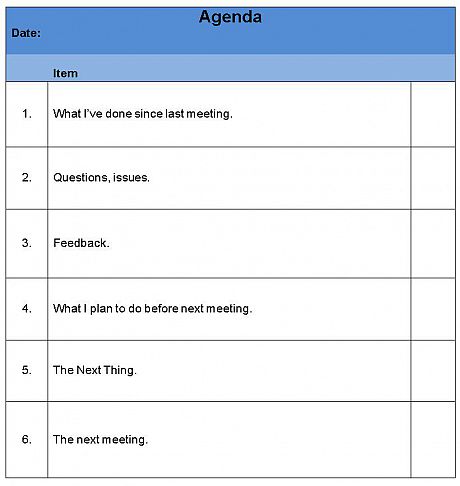
How to use the template
1. what i’ve done since last meeting.
Make sure you have some progress to report! Especially if you agreed actions last time.
2. QUESTIONS, ISSUES
If something has been bothering you or if you don’t understand something, ask your supervisor as soon as possible. Ignoring a problem causes unnecessary stress and creates obstacles.
3. FEEDBACK
Discuss any feedback you’ve already received (e.g. by email), or ask your supervisor to discuss any submitted work.
4. WHAT I PLAN TO DO BEFORE NEXT MEETING
Agreeing objectives and introducing accountability boosts productivity and progress
5. THE NEXT THING
Breaking down your work into tiny manageable tasks makes it much easier. Agreeing the next task with your supervisor gives you a clear direction. It might be reading a particular journal article, writing 500 words on an experiment, or making contact with a colleague.
6. THE NEXT MEETING
Scheduling your next session creates momentum and avoids leaving long gaps between meetings.
Copyright © 2024, University of Sussex
Thank you for visiting nature.com. You are using a browser version with limited support for CSS. To obtain the best experience, we recommend you use a more up to date browser (or turn off compatibility mode in Internet Explorer). In the meantime, to ensure continued support, we are displaying the site without styles and JavaScript.
- View all journals
- Explore content
- About the journal
- Publish with us
- Sign up for alerts
- CAREER COLUMN
- 10 December 2021
Managing up: how to communicate effectively with your PhD adviser
- Lluís Saló-Salgado 0 ,
- Angi Acocella 1 ,
- Ignacio Arzuaga García 2 ,
- Souha El Mousadik 3 &
- Augustine Zvinavashe 4
Lluís Saló-Salgado is a PhD candidate in the Department of Civil and Environmental Engineering at the Massachusetts Institute of Technology, Cambridge. Twitter: @lluis_salo.
You can also search for this author in PubMed Google Scholar
Angi Acocella is a PhD candidate in the Center for Transportation & Logistics at the Massachusetts Institute of Technology in Cambridge. LinkedIn: @angi-acocella.
Ignacio Arzuaga García is a PhD student in the Department of Civil and Environmental Engineering at the Massachusetts Institute of Technology, Cambridge. LinkedIn: @ignacioarzuaga.
Souha El Mousadik is a PhD student in the Department of Civil and Environmental Engineering at the Massachusetts Institute of Technology, Cambridge.
Augustine Zvinavashe is a PhD candidate in the Department of Civil and Environmental Engineering at the Massachusetts Institute of Technology, Cambridge.
When you start a PhD, you also begin a professional relationship with your PhD adviser. This is an exciting moment: interacting with someone for whom you might well have great respect and admiration, but who might also slightly intimidate you.
Access options
Access Nature and 54 other Nature Portfolio journals
Get Nature+, our best-value online-access subscription
24,99 € / 30 days
cancel any time
Subscribe to this journal
Receive 51 print issues and online access
185,98 € per year
only 3,65 € per issue
Rent or buy this article
Prices vary by article type
Prices may be subject to local taxes which are calculated during checkout
doi: https://doi.org/10.1038/d41586-021-03703-z
This is an article from the Nature Careers Community, a place for Nature readers to share their professional experiences and advice. Guest posts are encouraged .
Competing Interests
The authors declare no competing interests.
Related Articles

Why you need an agenda for meetings with your principal investigator

- Research management

I had my white colleagues walk in a Black student’s shoes for a day
Career Q&A 28 MAY 24

Changemakers — Nature’s new series celebrates champions of inclusion in science
Editorial 28 MAY 24

Researcher parents are paying a high price for conference travel — here’s how to fix it
Career Column 27 MAY 24

What steps to take when funding starts to run out
Career Feature 24 MAY 24
Lack of effective intercultural communication is hobbling academia — fix it for research equity
Correspondence 21 MAY 24

How researchers in remote regions handle the isolation

Guidelines for academics aim to lessen ethical pitfalls in generative-AI use
Nature Index 22 MAY 24
Faculty Positions at Great Bay University, China
We are now seeking outstanding candidates in Physics, Chemistry and Physical Sciences.
Dongguan, Guangdong, China
Great Bay University, China (GBU)
Postdoctoral Associate- Medical Image Analysis
Houston, Texas (US)
Baylor College of Medicine (BCM)
Postdoctoral Associate- Optogenetics, Voltage Imaging, and All-Optical Electrophysiology
Postdoctoral and visiting scholar positions in immunology, stem cells, and cancer.
Postdoctoral Research Fellow and Visiting Scholar positions in immunology, stem cells and cancer are immediately available at UConn in USA
Storrs Mansfield, Connecticut
University of Connecticut-Lai's Lab
Zhejiang Provincial Hospital of Chinese Medicine on Open Recruitment of Medical Talents and Postdocs
Director of Clinical Department, Professor, Researcher, Post-doctor
Hangzhou, Zhejiang, China
The First Affiliated Hospital of Zhejiang Chinese Medical University
Sign up for the Nature Briefing newsletter — what matters in science, free to your inbox daily.

Quick links
- Explore articles by subject
- Guide to authors
- Editorial policies
Faculty of Graduate Research Te Here Tāura Rangahau
Supervision meetings.
Find out what to expect during meetings with your supervisors.
During your initial meetings with your supervisors we advise you to talk about the following things.
Confirmation of provisional registration
The Confirmation of Provisional Registration form must be completed within one month full-time (or equivalent) of your official start date. This will need to be completed with your supervisor present or via video call as they will need to answer relevant sections of the form.
Clarifying expectations
Discuss expectations with your supervisors when you first meet them. When difficulties develop between supervisors and students, it is often because of unclear expectations.
We advise students and supervisors to draw up a written agreement on issues such as:
- frequency of meetings
- how both student and supervisors will prepare for meetings
- the student's submission of written work
- feedback from supervisors
- joint authorship
- how to resolve difficulties that arise within the supervision relationship.
You and your supervisors will need to agree on dates for the completion of each phase of your research. Draw up a timetable in consultation with your supervisors. This should include:
- time for meetings, research and the collection of data
- dates for the submission of interim reports, the full research proposal, thesis drafts and the final thesis
- any plans to write, submit and revise manuscripts for publication.
A guide to meetings
Meeting frequency.
How often you meet with your supervisors will vary depending on your discipline and the stage of your research. As a general rule, you should have a meeting at least once a month.
Discuss frequency of meetings and access to your supervisors when you see your supervisors for the first time.
- Your supervisors have other students, courses to plan, lectures to write and articles to publish. You will not have unfettered access to your supervisors.
- If you have scheduled a meeting, you and your supervisors should turn up on time. If you can't make it, let everyone know in advance.
- You will need different amounts of input from your supervisors at different points in your candidature. Sometimes you will only need minimal supervision.
Preparing for meetings and getting the most out of them
Your supervisors will expect you to prepare for meetings, and you can expect that they also prepare. Your supervisors should have read and commented on work you have provided for discussion at the meeting.
There are some strategies you can adopt to get the most out of meetings (not all will apply at any given point in your candidature).
- Set goals for meetings. What do you want to achieve in this session?
- Provide material in writing, well before the meeting, for your supervisors to comment on.
- Come to meetings armed with specific questions. Rather than saying ‘I don’t know what to read’, ask ‘Is there a good starting point to get into the literature on this particular topic?’ Rather than saying ‘I’m stuck’, explain the problem that is preventing you from making progress. Rather than asking ‘What should I do?’, ask ‘Which of these options would it make sense to pursue?’
- Listen carefully to what your supervisors say.
- Argue back when you disagree (though remember that your supervisors have experience of the standards required of a doctorate and a broad knowledge of your discipline).
- After meetings, email your supervisors a summary of the main discussion points and decisions. This gives supervisors a chance to confirm your understanding of things. It also acts as a memorandum for you.
Keeping records of meetings
Supervisors should keep a record of meetings and make note of any significant advice or discussions.
This meeting template from Thinkwell may help you keep track of decisions made.
- For candidates
- For employers
- For members
- English (EN)
- Nederlands (NL)
How to have Efficient Meetings with your Supervisor
Depending on the habits of your supervisors, he/she may be popping his/her head through your door every day for a quick chat, you may be meeting on a weekly basis, or only by appointment. Typically, you will have more meetings in the beginning, while your supervisor helps you with getting started, less meetings in the middle of your PhD trajectory when you are crunching numbers and doing experiments, and more meetings towards to end, to discuss your thesis chapters.
Even if your supervisors checks on you almost daily, you will need to have meetings at regular intervals to discuss in more depth about your research. If you want to get the most out of your meetings, a bit of preparation goes a long way.
Here are the different ways in which you can prepare yourself for an efficient meeting with your supervisor:
1. Send written material ahead of time
Give your supervisor at least one week of time to work through some documents prior to the meeting if you meet less frequently, or give him/her three days if you meet (almost) weekly. If you send material ahead of time, your supervisor will be able to read about your current progress, and will be able to point out what you are missing, and perhaps give you some feedback on your writing .
Written material can be a great starting point for discussions, not just about the contents of your work, but also about where you could possibly present or publish your work. The earlier you start writing , the earlier your supervisor will be able to help you find your writing voice, and will be able to comment in more detail on your thoughts.
2. Present your main insights with a short presentation
A presentation with five slides, mostly visual information, can be another excellent starting point for your meetings. Summarize the material of the written document that you sent, so that you can quickly remind your supervisor about what you are working on, and what you have discovered in the last weeks. Keep text on your slides to a minimum - you don't want to give a formal presentation to your supervisor, but projecting sketches, plots, and other visual information, or formulas, can be a good starting point for discussing your progress.
3. Develop a template for recording your meetings and expectation
At the beginning of your PhD trajectory, develop a template that you can use for your meetings. You can see an example of such a template in the figure below. Make sure you include a short agenda, list the references you want to discuss, leave space for taking notes of what you discussed during the meeting, and then agree on your actions for the next meeting.
4. Show options that you are thinking about
If you are stuck in your research, don't go to your supervisor hoping that he/she will hand you the solution on a golden platter . Since you are most into your research, you are expected to come up with solutions. When you are stuck, don't just accept the situation. Be creative, and think about possible solutions. Once you've outlined possible solutions, jot down a few ideas about the benefits and limitations of each of these solutions. With this material, discuss with your supervisor about the steps you should be taking next in your research. Don't take a passive attitude.
5. Briefly touch upon your planning
Discuss your planning during every meeting. Make sure you reserve at least 5 minutes of time during the meeting to discuss possible delays you have, and what your tools are to make sure you graduate on time. Discuss your short-term goals, your medium-term goals, and long-term goals. Your short-term goals can include the timing of the portion of research you currently are working on. Your medium-term goals can include a short discussion about which conferences you should attend, and where you should publish your research. Your long-term goals will be the discussion about your overall progress and if you are still set for graduating on time.
6. Come up with ideas and suggestions
Don't expect your supervisor to decide how you should carry out your research, which conferences you should attend, and where you should aim to publish your work. Come up with ideas and suggestions yourself. Show that you are growing into an independent researcher. Propose attending conferences, propose to submit your work to a certain journal, and, as discussed above, always have solutions in mind when you are faced with challenges in your research. Make sure you are in charge of your PhD progress.
Recent blog posts
Tenure track in the netherlands, tips for successful collaborations with government partners, tips for successful collaborations with industry partners, how to compile your publication list, how to develop a publication strategy, how to use x (twitter) as a scientist, centering your teaching around your teaching vision, how to build up an (international) network, transitioning into the last leg of your phd journey, what changes between a postdoc and assistant professorship.
Checklist for first meetings between supervisor and doctoral student
A useful checklist of things that might be discussed during the first few meetings between supervisor and student
- View more publications in Doctoral College
first-meeting-checklist-supervisor-doctoral-student.pdf
Doctoral College [email protected]
Getting the most out of thesis supervision meetings
Chances are that postgraduate students meet their thesis supervisor/s only every few weeks, and for a limited amount of time. Therefore, it is extremely important to take full advantage of supervision meetings. The following tips help bachelor’s, master’s and PhD students to make the most of thesis supervision meetings.
What can you expect from a thesis supervisor?
Taking charge of thesis supervision meetings, pre-meeting progress updates before thesis supervision meetings, agendas and note-taking strategies during thesis supervision meetings, post-meeting action points after thesis supervision meetings.
Before diving into what you can do to get the most out of thesis supervision meetings, it is important to be clear on the roles during a thesis process:
A thesis supervisor supports and guides you through writing your thesis. However, ultimately you are responsible for your work.
What this role division means in practice is that students cannot expect their thesis supervisor/s to tell them exactly what to do. And the thesis supervisor/s will not simply provide students with solutions to their challenges on a silver platter.
That said, a supervisor’s role is crucial. He or she will guide you in your writing, point out weaknesses in your argument and approach, and make suggestions for improvement. Furthermore, you can benefit from their experiences and scientific knowledge.
Considering that students are ultimately responsible for their thesis, they do benefit from taking charge of supervision meetings.
First and foremost, it means that students should be proactive. They should stay on top of time planning. They should keep track of a regular supervision schedule. And they should let the supervisor/s know what they need in terms of support and advice.
Pre-meeting updates, a meeting agenda and strategy for note-taking, as well as post-meeting action points, help students to get the most out of thesis supervision meetings.
Each of these points will be explained in more detail below. Combined, they offer concrete and repeatable structure to prepare, take part in, and summarise thesis supervision meetings.
It is never too late to change your approach to thesis supervision meetings. Just introduce the new structure to your supervisor/s and explain how it helps you to keep track of your progress. Most supervisors appreciate it when students take responsibility for their learning.
Pre-meeting updates are a summary of the progress you made since your last meeting.
Both master’s and PhD thesis supervisors tend to supervise many students at the same time. They might lose track of the progress of individual students. Progress updates before a meeting help to bring everyone up to date.
Sending around progress updates before the meeting also saves a lot of time: during the meeting, you can dive much more quickly into the discussion of your challenges and how to move forward.
In the pre-meeting updates, it is also advisable to already share your main questions and struggles in advance. Be very clear in stating what you need from your supervisor/s. It helps them to prepare.
And of course, if you have written text for review, make sure to give your supervisor/s enough time to review it. Supervisors have busy agendas. So don’t hand in the written text an hour or a day before the meeting.
- Send around a progress update before the meeting.
- Specify the questions and challenges you would like to discuss.
- If applicable, share written text well in advance.
During a thesis supervision meeting, be prepared. Have an agenda ready, and share it with your supervisor/s at the beginning of the meeting.
The agenda should reflect the key points that you would like to discuss during the meeting.
In addition to the agenda, explain what your key objectives are for the meeting. Then, ask if your supervisor/s would like to add points to the agenda. Edit the agenda on the spot so that all points and objectives are reflected.
A good agenda helps to structure the discussion and it ensures that all relevant points will be addressed.
Furthermore, have a good note-taking strategy in place. Even if you understand everything that is said during a supervision meeting, it can be tough to remember it all.
Either take your time to take proper notes by hand or ask all parties present whether it is okay to record the meeting. You will thank yourself later.
- Come prepared, with an agenda and meeting objectives.
- Make space for unplanned discussions and feedback in the agenda.
- Take detailed notes or ask to record the meeting.
Phew! The meeting is over. What’s next?
Take a day or two to reflect on the meeting. Sit down, have a look at your notes, and then develop action points that came out of the discussion.
Action points can be agreements made with the supervisor/s on content, research methods, writing style, you name it. Compile a short but concrete list of the steps you will take to progress with your thesis. Where applicable, also include specific deadlines and notes on time-planning.
Then, send the post-meeting action points to your supervisor/s.
Why? Because there is a chance that you misunderstood each other. Asking your supervisors for brief feedback on your action points provides an extra layer of security. It shows whether you are on the same page and whether you are moving in the right direction.
Furthermore, it is always good to have your agreements in writing. It can help, for instance, if you run into trouble because you have to deal with conflicting feedback from different supervisors .
Lastly, already start to prepare for the next meeting. If you haven’t done it yet, send a calendar invite to your supervisor/s, so that everyone can block the time of your upcoming thesis supervision meeting in their agenda.
- Develop concrete action points after the meeting, and share them with your supervisor/s.
- Reiterate agreements on deadlines and time-planning.
- Send out calendar invites for the next meeting.
Master Academia
Get new content delivered directly to your inbox.
Subscribe and receive Master Academia's quarterly newsletter.
Strong academic networks through shared activities
Why and how to conduct a systematic literature review, related articles.

Why you cannot write a PhD thesis in 3-6 months

How to write a fantastic thesis introduction (+15 examples)

Left your dissertation too late? Ways to take action now

Dealing with conflicting feedback from different supervisors
- Shopping Cart
- Free planners and guides
PhD Toolkit
Free templates and planners available for you to download.
The book Planning Your PhD describes a number of planners and forms you can use to help plan your PhD. You can download these planners and forms below.
- Show Planners
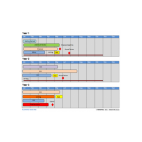
Thesis Planner - Moveable tasks
This planner allows you to work out the timeline for the major tasks of your PhD. ..

Thesis Planner - No tasks
This planner allows you to work out the timeline for the major tasks of your PhD ..
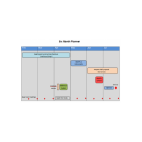
Six Month Planner - Moveable tasks
The Six Month Planner lets you map out your tasks for the next six months ..

Six Month Planner - No tasks
This blank planner shows you the next six months which you can fill in ..
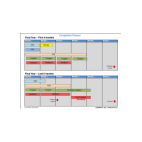
Completion Planner - Moveable tasks
This Completion Planner allows you to work out the timeline for the major tasks of the final year..
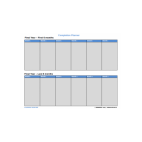
Completion Planner - No tasks
This blank Completion Planner shows you the final twelve months of your PhD ..
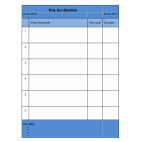
This Six Months
This form helps you identify your targets for the next six months ..
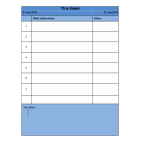
Use this form to map out your tasks for the coming week ..
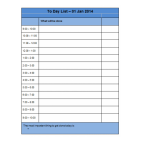
To Day List
Use this form to plan out your day and identify when the important jobs are going to get done ..
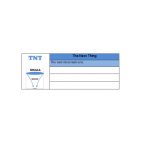
The Next Thing
To help you get clear about your very next task ..
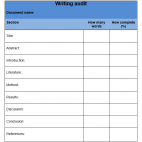
Writing Audit
Use the Writing Audit to work out how much writing you have done and update it as you add new wor..
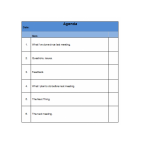
Meeting Agenda
A template agenda for meetings with your supervisor ..
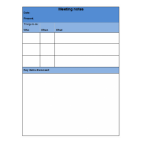
Meeting Notes
A template for noting down the outcomes of your meetings with your supervisor ..

PhD Toolkit - All forms
Download all PhD Toolkit forms in a zip ..

PhD Toolkit - All planners
Download all PhD Toolkit planners in a zip ..

IMAGES
VIDEO
COMMENTS
7. Date / content of next meeting This is often left until the last item or left off the agenda entirely, but it is one of the most important elements of your role as a supervisor: to create an and approached without hesitation. It should appear near the top of the agenda. Feedback needs to be on: 1. Progress of the PhD Project 2.
These three objectives can be further supplemented by following these suggestions during supervisory meetings with your PhD students. 1. Prepare in advance for themes or topics requiring discussion. Well before the meeting, encourage the student to email a tentative agenda or proposal to you. Ahead of the meeting, you, as the supervisor, read ...
You are responsible for organising the meeting. Make sure you organise your doctoral meeting well in advance and plan your agenda with time-realistic activities. A good way to do this is by rehearsing what you are going to present and then timing yourself. Additionally, ask yourself if the information you are presenting is key to helping your ...
8 tips on how to prepare for PhD supervision meetings. In this video I share some tips on how to plan effectively for meetings with PhD supervisors, based on...
It also helps you to agree actions and monitor progress. Few supervisors will adopt this structured approach, so it is perfectly acceptable for you to suggest better ways of working. This meeting agenda template from Thinkwell provides an excellent basis for planning supervisory sessions. It's available as a Word document, so you can easily ...
of the PhD. Start early A good way to avoid confusion or mismatch of goals later on is to set clear expectations early in the process. Depending on the discipline and whether the student's PhD project is a lone project or part of a team, this 'expectations meeting' is recommended to take place at some point during the first three months.
Include one or two sentences summarizing the agenda and what you want to get out of the meeting. During the meeting, be proactive. Take note of the topics you should follow up on, and their ...
PhD Supervision Meeting Agenda. Date: 1: What I've done since the last meeting; 2. Any questions/difficulties that arose. 3. Feedback. 4. Agreed actions & deadlines. Author: Catherine Pope Created Date: 10/07/2020 06:30:00 Last modified by:
Here is a survival strategy. First, forget your agenda. It's unlikely that you'll make progress on the points you planned to discuss once the meeting takes such a negative turn. Second, listen, don't argue, then summarize the accusations and repeat them back. This demonstrates that you're taking them seriously.
I Regular meetings, perhaps as a mixture of group meetings and individual meetings. I Regulations require minimum of 2 meetings every 3 months. I Most Informatics PhD students will meet their supervisors more regularly. I If your supervisor relies on group meetings, but you feel there is a need for regular 1-1 meetings, please ask for that!
PhD Supervision Meeting Agenda. Achievements since last meeting: The research/ PhD. As a developing researcher. Feedback to the student: Project progress. Progress as a developing researcher. Feedback to the supervisor. Current questions / issues / decisions to be made. What will they do in the next few weeks / months? The immediate priority ...
The Meeting Planner is a tool for candidates and supervisors to assist effective management of supervisory meetings. The candidate completes the template prior to the meeting with an update on progress with the PhD or Masters by Research project, then the supervisor/s and candidate discuss the points together. On the back of the page, the ...
26. Speaking from experience, both as a student and as a Phd supervisor in theoretical computer science. The meetings with your supervisor serve many purposes. To narrow the scope a little bit, let me only discuss the type of meetings you mention - where you read a research paper and discuss it to a high level of detail with your advisor.
The agenda is a required component for your supervisor to sign off the meeting. The agenda must include input for the target and progress sections. However, the amount of detail entered here is a decision for you and your supervisors. Preparation before formal meetings is good professional practice to help identify issues that you need to discuss.
the initial meeting(s) between supervisor and doctoral student. Supervisors may need to liaise with their Director of Studies if they are unsure of any of the information below: 1. Department Induction - to address any queries regarding recent departmental/ School/Doctoral Training Entity induction including the local academic culture, key
After meetings, email your supervisors a summary of the main discussion points and decisions. This gives supervisors a chance to confirm your understanding of things. It also acts as a memorandum for you. Keeping records of meetings. Supervisors should keep a record of meetings and make note of any significant advice or discussions.
Here are the different ways in which you can prepare yourself for an efficient meeting with your supervisor: 1. Send written material ahead of time. Give your supervisor at least one week of time to work through some documents prior to the meeting if you meet less frequently, or give him/her three days if you meet (almost) weekly. If you send ...
Remember, PhD advisors are often incredibly busy but they want to help you so that your project is productive and successful.Best Practice for PhD advisory m...
A useful checklist of things that might be discussed during the first few meetings between supervisor and student. Form. View more publications in Doctoral College. first-meeting-checklist-supervisor-doctoral-student.pdf. 245.64 KB.
A better relationship often results in better and timely completion of a dissertation. This finding is backed up by science. This study, for instance, points out that student-supervisor relationships strongly influence the quality, success or failure of completing a PhD (on time).. Good communication with a dissertation supervisor is key to advancing your research, discussing roadblocks, and ...
Pre-meeting updates, a meeting agenda and strategy for note-taking, as well as post-meeting action points, help students to get the most out of thesis supervision meetings. ... Both master's and PhD thesis supervisors tend to supervise many students at the same time. They might lose track of the progress of individual students.
Some supervisors also arrange meetings with groups of their re-searchers. In order for the relevant discussion points to be covered, it is expected that the supervisor and researcher dedicate a certain amount of time for the meeting; however, it is also clear that the length of the meeting will depend on the content of the meeting
Free templates and planners available for you to download. The book Planning Your PhD describes a number of planners and forms you can use to help plan your PhD.